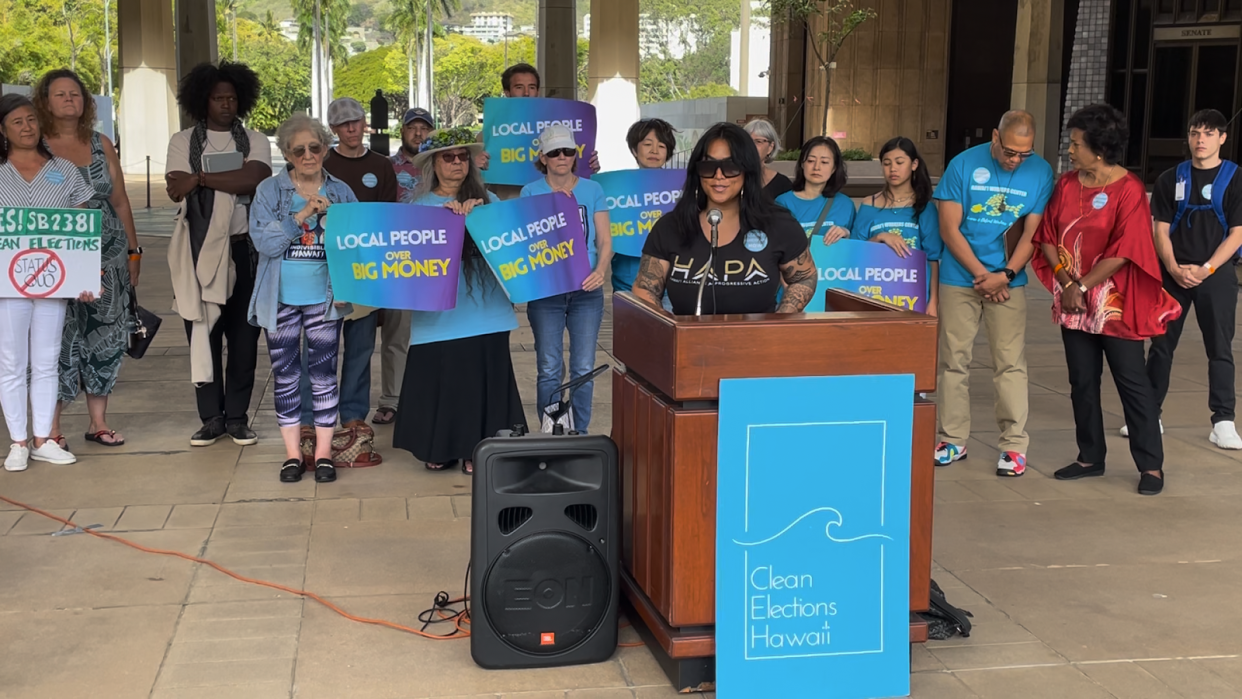Advocates rally for "clean elections" in Hawaii as legislation stalls

More than two dozen advocates for election reform rallied at the Hawaii Capitol on Monday to support a public financing program for political candidates, known as “clean elections,” after it stalled in committee.
Groups such as the Hawaii Workers Center, Indivisible Hawaii, and Hawaii Alliance for Progressive Action support new legislation that could lead to a new generation of officials in Hawaii. With full public financing, more candidates would prioritize their constituents’ concerns over fundraising, reducing their reliance on donors’ priorities.
“Although Senate Bill 2381 met its demise in committee last week, the momentum for a clean elections program remains strong, particularly with (a similar bill) currently undergoing conference committee negotiations,” emphasized Kris Coffield, Co-Chair of the Democratic Party of Hawai’i’s Legislative Committee. “Clean elections stand as one of the Democratic Party’s top priorities this year. Failing to pass it is simply not an option.”
Lisa Gibson, President of Indivisible Hawai’i, echoed the sentiment, stating, “As voters, it is our responsibility to demand that elected officials prioritize serving their constituents. We will take note of those in office who demonstrate the moral compass to take action on clean elections for Hawaii and ensure the vitality of our democracy.”
A recent poll conducted by Clean Elections Hawaii Coalition found that 71% of Hawaii registered voters support publicly funded campaigns.
More: Hawaii has a voter enthusiasm problem, could publicly funded campaigns help?
How would the bill have worked?
Under this proposed system, candidates demonstrating sufficient voter support would be eligible to receive public funding for their campaigns. For example, a candidate running for the Hawaii House of Representatives could secure up to $50,000 by gathering support from 200 contributors, each donating $5 to their campaign.
The funding amounts would vary depending on the position sought, with gubernatorial and lieutenant governor candidates potentially receiving up to $2.5 million. However, candidates seeking public funding must adhere to spending limits and be prohibited from raising private donations.
Proponents contended that the funding system would create fairer competition, enabling individuals to be elected without dependence on campaign contributions from special interest groups like businesses, unions, and political action committees.
However, this argument was criticized during oral testimony last week. Chuck Freedman, a Hawaii political and government operative, warned that super PACs could still spend large amounts of money to influence election outcomes.
Why did the bill fail?
Although the bill unanimously passed the Hawaii Senate and was championed by Hawaii State House Speaker Scott Saiki, it faced a deadlock in the House Judiciary and Hawaiian Affairs Committee this past Thursday.
Chair Rep. David Tarnas cited various reasons for its dismissal, but the primary concern was inadequate funding. Tarnas described the bill as “fatally flawed” because it did not include the estimated $30 million needed to implement the proposed program.
‘It does not have the necessary funding and positions needed to do the required work to prepare for the implementation of this comprehensive, publicly financed election,” Tarnas said. “And I think this bill is really misleading the public by asserting that it sets up a workable, comprehensive, publicly financed by an election campaign.”
During the hearing, concerns were also raised about how to verify if candidates qualified for public funding under the proposed system. Tarnas pointed out that the bill didn’t offer a feasible mechanism for this, making it less likely to succeed.
Some committee members worried about the bill’s broader implications, particularly its financial burden on the state. Tarnas mentioned that colleagues were concerned about whether the state would end up footing the bill for elections at the county level, which they opposed.
Jeremy Yurow is a politics reporting fellow based in Hawaii for the USA TODAY Network. You can reach him at JYurow@gannett.com or on X @JeremyYurow
This article originally appeared on USA TODAY: Advocates rally for "clean elections" in Hawaii.

